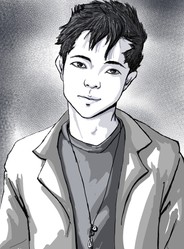 Years of writing stories has taught me to embrace beta-readers. (By which I mean bear-hugs, in between bouts of prostrating myself in gratitude at their feet.)
Years of writing stories has taught me to embrace beta-readers. (By which I mean bear-hugs, in between bouts of prostrating myself in gratitude at their feet.)
These are the people who proof-read your work. They point out the typos, correct your dodgy grammar, help retain the continuity and get to say, 'Erm, what did you actually mean here? Because it's juvenile gibberish.'
All of this is the bread and butter. It keeps your work looking polished, so that the reading public are none the wiser that it was once all a bit flaky. But there are moments when beta-readers really come into their own. Moments like Darren in fact.
Only twice in my life has it come to this. Usually one of the previous solutions does the trick. But if they've failed, then the only recourse is to add a second, non-fictional mind into the mix. Be honest. Tell your beta-reader straight out that you don't know what you're doing.
(They will never admit it, but they've long since accepted their unspoken duties in calming your creative temperament. They'll be less surprised than you could comfortably imagine.)
The first time I had to call in someone to read a scene and tell me what had gone wrong, it turned out to be my fault. I thought I had stopped trying to be a control freak. I hadn't. I was trying to force my character into acting out of character. What can I say? I was young and needed the money.
In short, it was all the way back to solution number one. Really letting go was very rewarding. I got another twelve novels out of that previously unruly character.
Last night, Darren took me into my second ever major SOS. This time my beta-reader admitted that she was as lost as I was. She couldn't get her head around him either. That wasn't quite what I wanted to hear. But all was not lost.
"What kind of character do you think Darren is?" I asked. She pondered it and spoke aloud. We compared notes. She talked. I listened. I talked. She listened. Suddenly she said something which set a light-bulb off in my head. It illuminated Darren completely. It showed that he hadn't been out of control at all. In fact, once you knew what he was up to, it was a delicious, quite fascinating story-line.
It turned out that I'd been trying to control him too much. Trust your characters, and remember rule number one: let them tell their story in their own way.
Funny how it always comes back to that.


 It's not writer's block. It's something far less tangible, and nearly as frustrating, as all that; and it happened to me last night.
It's not writer's block. It's something far less tangible, and nearly as frustrating, as all that; and it happened to me last night. Sometimes the problem isn't losing control, it's the author being a control freak.
Sometimes the problem isn't losing control, it's the author being a control freak. Usually these situations only happen with a new character or a cameo. It's unlikely to be one who has already starred in several solo chapters, or who has had whole stories told from their point of view.
Usually these situations only happen with a new character or a cameo. It's unlikely to be one who has already starred in several solo chapters, or who has had whole stories told from their point of view. Darren was seriously stubborn. I let him have his way, then I walked away. I wrote a scene from his point of view. He still ran rampant through my story, ripping up plots and making my other characters demand time out.
Darren was seriously stubborn. I let him have his way, then I walked away. I wrote a scene from his point of view. He still ran rampant through my story, ripping up plots and making my other characters demand time out. Years of writing stories has taught me to embrace beta-readers. (By which I mean bear-hugs, in between bouts of prostrating myself in gratitude at their feet.)
Years of writing stories has taught me to embrace beta-readers. (By which I mean bear-hugs, in between bouts of prostrating myself in gratitude at their feet.)







 St Tydecho's Churches in West Waleson 09/03/2014
St Tydecho's Churches in West Waleson 09/03/2014
 Goodies for an Outlander Premiere Partyon 03/06/2015
Goodies for an Outlander Premiere Partyon 03/06/2015
 Holocaust Memorial Day Interview with Rainer Höss, Grandson of Rudolf Architect of Auschwitzon 01/24/2015
Holocaust Memorial Day Interview with Rainer Höss, Grandson of Rudolf Architect of Auschwitzon 01/24/2015
 Romantic Valentine Gifts for an Outlander Fanon 01/16/2015
Romantic Valentine Gifts for an Outlander Fanon 01/16/2015



Comments
Oooh! That's a really interesting solution! I can see how it would work. Thank you.
When I was writing fan-fiction, I did it the opposite way around. For the first 3 or 4 books, it was generally two characters, with occasional cameos. Then I suddenly brought in a cohort of about 13 temporary main characters. It was a tremendous change of pace, but can quickly become unwieldy.
I've never had the opportunity to do it in the opposite direction, as you just high-lighted.
Here is my tip which is useful in most situations where character doesn't really fit for any reason, but writer (most writers are sentimental) still wants to keep at least part of the character or some of his characteristics (which are probably the reason to introduce the character in the first place).
Give these characteristics to another character. That has pros (adds depth) and cons (you will probably have to do some rewritings).
Example: Rumpelstiltskin (to many more known as Miller's daughter). We have four characters: miller, his daughter, king and Rumpelstiltskin. All have very clear functions and are pretty two dimensional. If, for some reason, we want to make a good drama of this story, we can for instance melt king and Rumpelstiltskin in one and miller and his daughter in other person. Now we have only two characters with much more depth and many possible situations to write real drama (or one powerful scene in a novel).
Reducing number of characters almost always leads to better results. I hope this helps somebody:)
You're very welcome.
It's rare for this sort of thing to happen. I've been writing novels for years and it's only happened to me twice. I've been speaking with fellow author friends. It had happened to one of them once and never to any of the others.
It's very weird and highly frustrating when it does happen, though my experience* is that the character in question generally turns out to be amazing to write, when you get him/her. Only the most strong-willed, thus interesting, characters can spin out of control.
* Experience, in this instance, being two characters. Hardly a comprehensive data set. LOL
Love this! I've just started on my first novel and haven''t met an out of control character yet, but I'm sure I will. Now I have some tips on what to do when I meet him or her!
I think I must have misled you a little. The scenario wouldn't play out, because the person doing the proof-reading waits until the story is well advanced. I give her the heads up when I know that the early chapters are set in stone. Put it this way, I'm currently writing chapter 36. My proof-reading beta-reader is correcting chapter 3. My cheer-leading betas are up with me on chapter 35.
I so hate re-writing scenes. :(
Jo, doing it by stages would save you all a lot of work. Imagine that your beta reader has already proofread a scene and perfected typos and grammar and later, after the novel is finished you re-read it and delete that scene because it doesn't fit in anymore. All the proof reading and correcting work for that part of your book is wasted. Some applies when you re-write scenes. SY
It may be that I've got a different relation with my beta-readers. It's usually been a team of three of us. I'm responsible for producing the story. Then there are two other people. One keeps pace with my writing and does precisely what you've described. The other progresses more slowly, doing what I've described. Both are vital to my mind.
And I'm glad that you liked the article. :)
Great article as always, Jo! But I must say I disagree somewhat with this statement: "(betareaders)... are the people who proof-read your work. They point out the typos, correct your dodgy grammar, help retain the continuity and get to say, 'Erm, what did you actually mean here? Because it's juvenile gibberish.'"
Beta-reading for me is cheering the author on ;-) and pointing out major problems like plot holes, unexplained changes in hair color of characters ect. Typos and grammar is what comes later, at the proof reading and editing stage. I noticed also that I write better and don't lose the flow so easily if I turn the spellchecker off.
Yay! I am quite partial to a little bit of vampiric inspiration. Good luck with it all.
You most certainly do have a great beta-reader there! I detest rewrites with an absolute passion. I've been known to ditch an entire story, just because I needed to rewrite too much of it.
Fortunately, my main beta-reader knows precisely how to phrase things, so that it doesn't sound like a rewrite. She's as adept at dealing with me, as she is dealing with the literature. It always reads much more tightly after her recommendations are in place.
{{{{hugs}}}} re your rewrites. But it sounds like you will have something worth publishing at the other end of it!